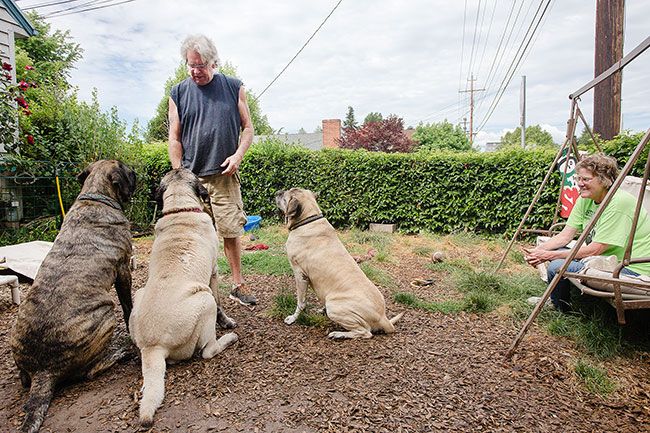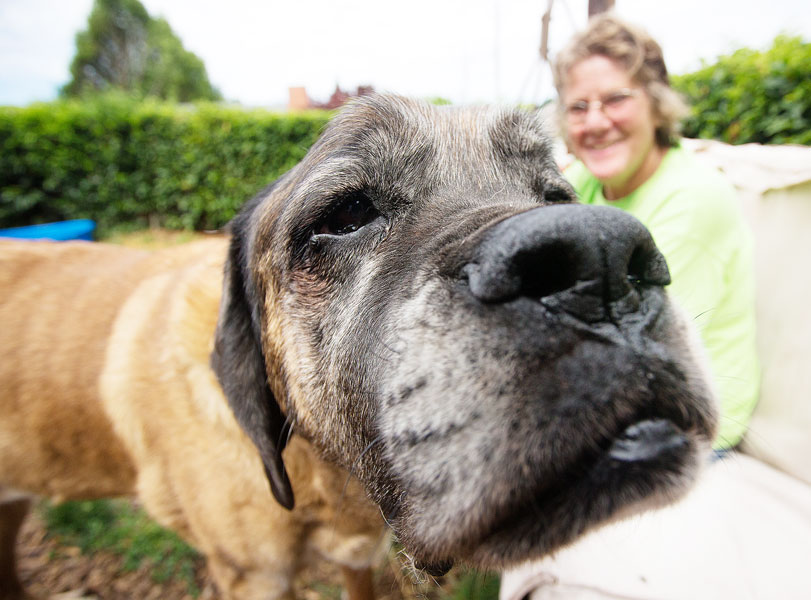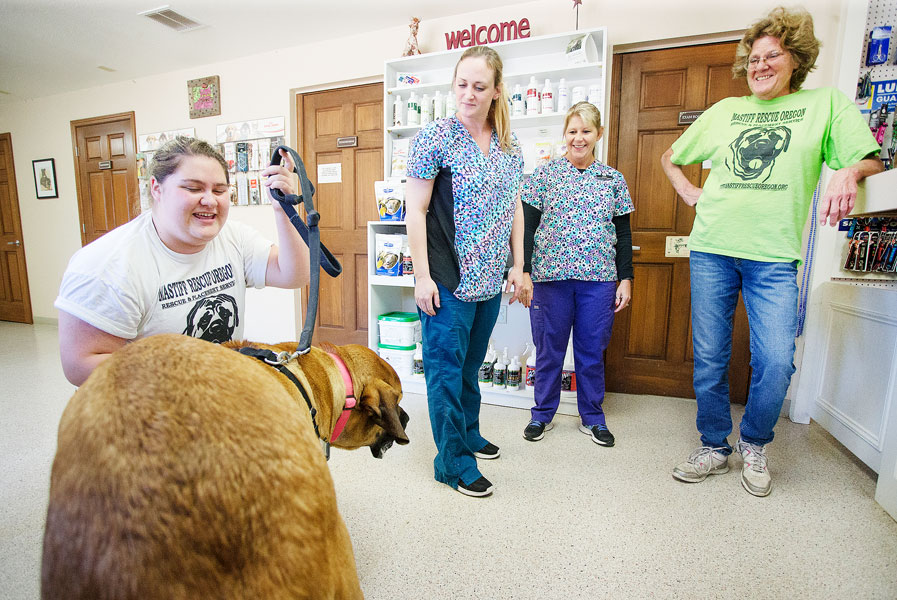Stopping By: Big dogs, big hearts
They remember each of the massive dogs as an individual.
There's Athena, "a snuggler with a high play drive" who cowers at the ring of a cell phone. And Rhea, who adored children. And George, a softie with a personal vendetta against the vacuum cleaner. He once enjoyed being the center of attention while filming a Dick Hannah commercial. And so many others.
"You learn their quirks. They're so sweet and funny," Susan said.
Most of the canines taken in by Mastiff Rescue Oregon live briefly with the Mays, or local foster families, then go to permanent homes in Oregon or other states.
Some, however, aren't adoptable, often because of age or illness, so they stay with the McMinnville couple in a dog's dream bedroom, complete with heat, air-conditioning and a king-size bed roomy enough for a 200-pound animal to stretch out.
The Mays feel it's their duty to make sure every mastiff is comfortable and secure for the rest of its life. "We took responsibility for them, so we're going to love and care for them," Susan said. "We want them to die happy."
That's one reason they started their own rescue program a decade ago after working with a national organization for a few years.
While they have good things to say about bigger rescue agencies, they disagree with those organizations' policies of accepting only young, fit dogs that will be quickly adopted.
In their eyes, all mastiffs deserve good homes. And that's what the dogs find at Mastiff Rescue Oregon.
------
The Mays, who also have three pet mastiffs, are animal lovers from way back.
When Gary was growing up in Carmel, California, his family had collies and other big dogs. Not as huge as mastiffs, though; these massive dogs stand 2-foot-3-inches to 2-foot-8-inches tall and weigh 130 to 220 pounds.
Susan fell in love with the breed when she met their neighbor's mastiff, Buster. When the man moved away suddenly, she took care of the affable dog for seven weeks before he was reclaimed.
"We liked Buster's temperament, very gentle and kind," Gary said.
Not everyone knows the gentleness that's characteristic of the mastiff breed. When the Mays are walking their dogs around downtown McMinnville, some people cross the street to avoid them. Others approach tentatively and ask if the mastiffs are friendly.
The answer is generally "yes." Mastiffs typically are docile, and most like children, as well as adults, the Mays said.
However, some rescued dogs have been traumatized, making them shy of humans.
If a dog shows any tendency to react fearfully, the Mays don't walk it in public places. "We can't have a dog that size freaked out," Gary said.
He promised, "If you see us walking a dog, it's a good dog."
Of course, even the friendliest mastiff might slobber all over a new friend.
And when mastiffs get to know you, Susan said, "they're Velcro dogs — they stick to you. They're loyal and funny and stubborn and just want to be loved."
------
She and her husband owned cats when they moved to McMinnville in the early 1990s.
A decade later, when they decided to add a dog to the family, they visited a mastiff rescue site in Washington. They figured they'd return with something fuzzy and cute, albeit large.
Instead, they found Jasmine, a 2-year-old who was afraid of new people and strange situations. She wasn't beautiful, with a dark brindle coat and features that showed she was a mastiff mix, rather than a purebred. She was tall, but weighed just 110 pounds — undersized. And she had arthritis, despite her youth.
"Nobody wanted her," Gary said.
They knew right away that "she needed us," Susan said.
Gary explained, "One look, and we couldn't not take her."
Jasmine turned out to be an incredibly loving, loyal dog, they said. Soon she was running on the beach and proudly walking around her neighborhood. "More people knew her name than my name," Gary said.
She accepted the next two mastiffs the Mays adopted: Bo, also a brindle, and Cosmo, an extra-large fawn, or classic tan, male. Later, Jasmine also put up with seeing a parade of rescued dogs pass through "her" territory.
Jasmine died at age 10, a victim of bone cancer. That's a common affliction of mastiffs, along with arthritis, eye trouble and heart or urinary problems, the Mays said.
------
Although she probably didn't know it, Jasmine inspired the Mays to start Mastiff Rescue Oregon.
Susan had sought advice about Jasmine several times from the Washington branch of Friends of Rescued Mastiffs, the rescue organization from which the dog came. When she found out FRM needed help in Oregon, she volunteered.
She took calls for the national program from vets, humane societies, animal control agencies and private parties. Over the years, she realized that many of the dogs in need were older, ill or otherwise difficult to adopt.
But FRM didn't take hard-to-adopt case. So she and Gary branched out on their own, vowing to help every dog that needed them.
And many did. In Mastiff Rescue Oregon's first decade, it took in two or three new dogs a month, about 240 in all. The Mays have rescued nine dogs in the first six months of 2017.
Some mastiffs come to them because their families can no longer afford to feed and care for them. Or the owners have to move into a place that's too small, not safe or not amenable to dogs. An owner may die, a couple may divorce or a new baby may arrive — too bad the owners don't realize how good mastiffs are with children, the Mays said.
They consider it especially tragic when an owner gets rid of a dog because it's no longer a cute puppy, or it's too big, old or infirm.
It's hard for Susan to understand how a person can turn his back on a pet. "I want them for 20 years," she said; in other words, she makes a lifelong commitment to her animals.
But even mastiffs that come from less-than-ideal conditions may not recognize her commitment at first. They may be afraid or confused when they're removed from the only home they've known.
Rescue dogs may sulk, eschew food or otherwise act stressed and depressed until they've adjusted.
For example, a young male named Diesel spent a week grieving. After the Mays gave him a lot of reassurance, he joined in the play.
Gary recalled another mastiff that distrusted men. She wouldn't even take a treat from him. So he left her alone, snuggling with another dog and giving it treats while they watched TV; the female sat across the room, growling occasionally.
After a couple days of this, he said, the female figured out that the other dog was having all the fun. She walked over, climbed onto the couch beside Gary and put her head in his lap.
"You have to do things with these dogs on their terms. Let them come to you," he said. "When they give you their trust, you feel great. It's a major accomplishment."
------
Usually it's not treats, but attention, that help mastiffs adjust. The Mays said they work with each new dog that comes into the rescue. They reassure, they play, they walk, they cuddle.
Many of the rescue dogs have been isolated, so they need to be socialized.
"It takes time and it takes effort," Gary said.
With Jasmine, for instance, the Mays took her to Carlton Vet every day "just so she could meet people," Susan recalled. Buchanan Cellars was another favorite place to let her meet both humans and canines.
George, on the other hand, was five weeks old and weighed five pounds when he joined the family a couple years ago. "We carried him everywhere and introduced him to everyone," Gary said.
As a result, George, a brindle, is friendly both to people and other dogs. He's one of the Mays' personal dogs, along with Leonie, a big fawn female, and the smaller fawn Gracie.
------
While the Mays take care of the mastiffs with the most needs, foster families help socialize some of the dogs.
Foster homes take in mastiffs for a few weeks or months — they don't know how long it will be before the dogs are adopted. Some dogs never leave; families fall for them and their "foster" homes become permanent.
Mastiff Rescue Oregon has three foster homes in McMinnville, but always needs more, Susan said. In fact, she said, "we have a desperate need."
She noted that the nonprofit supplies food, medicine, beds, bowls and other equipment in addition to paying vet bills.
Even with volunteers to foster some of the dogs, Mastiff Rescue Oregon is costly to run. The Mays give their time, as well, but the price of food, flea treatments, surgeries and other care runs into the thousands. Many dogs need regular medication for blood pressure, heart conditions and other problems.
Expenses also include a van for transporting mastiffs to and from vet appointments. Every dog that arrives at the rescue gets an initial check-up, X-rays and regular exams.
Mastiff Rescue Oregon charges an adoption fee of $500, but it doesn't come close to the cost of the dog’s care, the Mays said.
The program depends on donations. "People are very good," said Gary, thankful for every contribution.
Much of the support comes from Mastiff Rescue Oregon' three annual fundraisers: garage sales in May and September, and an upscale picnic in August at DePonte Cellars winery.
Starla Pointer, who is convinced everyone has an interesting story to tell, has been writing the weekly “Stopping By” column since 1996. She’s always looking for suggestions. Contact her at 503-687-1263 or spointer@newsregister.com.
Picnic benefits rescue organization
The 2017 Mastiff Rescue Oregon Picnic is slated for 5:30 to 8 p.m. Friday, Aug. 4, at De Ponte Cellars, 17545 Archery Summit Road, Dayton.
Attendees bring their own food. Music will be playing.
Mastiffs will be on hand to play with guests. Information about adopting the huge, friendly dogs through the rescue organization will be available, as well.
Entrance to the picnic costs $50, which includes a bottle of De Ponte’s Dundee Hills Pinot Noir and two Mastiff Rescue stemless wine glasses. Proceeds from ticket sales, plus a portion of the proceeds from additional wine sales, go to the rescue program.
For more information, go to www.depontecellars.com or www.mastiffrescueoregon.com.
Adopting a rescued mastiff
The goal of Mastiff Rescue Oregon is to find permanent homes for dogs, if possible, as well as to care for those who aren’t adoptable.
Mastiffs, the largest breed of dogs, are known for their sweet temperament and loyalty to their owners. “They give back love and affection tenfold,” said Susan and Gary May, who run the McMinnville-based rescue organization.
They call well-trained and socialized mastiffs “marshmallow dogs,” in fact.
They want to make sure new owners will treat these dogs right.
Before adopting from Mastiff Rescue Oregon, prospective owners must go through a home check to make sure the big dog will be safe. They need a tall fence if they plan to let the dog out in the yard; mastiffs, especially young ones, can step right over a three-foot fence, the Mays said.
For older dogs, single-story homes are best. Stairs can be a problem if a pet has hip problems or other disabilities.
But the new home doesn’t have to be huge. Mastiffs need regular exercise, but are content in smaller spaces as long as their beloved people are around. If a prospective owner is committed to regular walks, even an apartment can work for a mastiff, the Mays said.
Mastiffs usually get along with cats as well as other dogs, so many can be adopted into families that already have pets. Some, however, are best solo.
Above all, Susan said, a new home “has to be the perfect fit for the dog.” The prospective owner takes second place, in her opinion.
She makes sure new owners promise to shower their mastiffs with love and attention. “Snuggle with them, sit out on the porch with them, take them for walks and rides,” she and her husband suggested.
“They like it if you’re with them,” Susan said. “They don’t require a whole lot, just attention.”












Comments